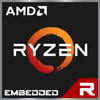
UNISOC T610 Benchmark, Test and specs
Last updated:
The UNISOC T610 has 8 CPU cores and can process 8 threads at the same time. The processor was presented in Q4/2019 and is based on the 0. Generation of the UNISOC 4G series. In the Geekbench 5 benchmark, the UNISOC T610 achieved a result of 344 points (single-core) or 1,234 points (multi-core).

| Name: | UNISOC T610 |
|---|---|
| Family: | UNISOC 4G (10) |
| CPU group: | UNISOC 4G 12nm (8) |
| Architecture: | |
| Segment: | Mobile |
| Generation: | 0 |
| Predecessor: | -- |
| Successor: | -- |
CPU Cores and Base Frequency
The UNISOC T610 has 8 cores. The clock frequency of the UNISOC T610 is 1.80 GHz. An initial performance assessment can be made using the number of CPU cores.
| CPU Cores / Threads: | 8 / 8 |
|---|---|
| Core architecture: | hybrid (big.LITTLE) |
| A-Core: | 2x Cortex-A75 |
| B-Core: | 6x Cortex-A55 |
| Hyperthreading / SMT: | No |
|---|---|
| Overclocking: | No |
| A-Core Frequency: | 1.80 GHz |
| B-Core Frequency: | 1.80 GHz |
Internal Graphics
The UNISOC T610 has an integrated graphics that the system can use to efficiently play back videos. The UNISOC T610 has the ARM Mali-G52 MP2 installed, which has 2 streaming multiprocessors (32 shaders).
| GPU name: | ARM Mali-G52 MP2 |
|---|---|
| GPU frequency: | 0.61 GHz |
| GPU (Turbo): | No turbo |
| Compute units: | 2 |
| Shader: | 32 |
| Hardware Raytracing: | No |
| Release date: | Q3/2020 |
| Max. displays: | 2 |
|---|---|
| Generation: | Bifrost 2 |
| Direct X: | 12 |
| Technology: | 16 nm |
| Max. GPU Memory: | -- |
| Frame Generation: | No |
Hardware codec support
Processors with integrated graphics can process video codecs faster. Support for modern codecs can significantly increase system efficiency during video playback.
| h265 / HEVC (8 bit): | Decode / Encode |
|---|---|
| h265 / HEVC (10 bit): | Decode / Encode |
| h264: | Decode / Encode |
| VP8: | Decode / Encode |
| VP9: | Decode / Encode |
| AV1: | No |
|---|---|
| AVC: | Decode / Encode |
| VC-1: | Decode / Encode |
| JPEG: | Decode / Encode |
Memory & PCIeThe UNISOC T610 supports a maximum of memory. Depending on the mainboard, the processor can use a maximum of 0 memory channels. This results in a maximum bandwidth of the main memory of --. |
|
| Memory type: | Memory bandwidth: |
|---|---|
| LPDDR4X-1600 LPDDR4-1600 LPDDR3-933 | -- -- -- |
| Max. Memory: | |
| Memory channels: | 0 |
| ECC: | No |
| PCIe: | |
| PCIe Bandwidth: | -- |
Thermal ManagementThe UNISOC T610 has a TDP of . Based on the TDP, the system manufacturer can and must adapt the cooling solution to the processor. |
|
|---|---|
| TDP (PL1 / PBP): | |
| TDP (PL2): | -- |
| TDP up: | -- |
| TDP down: | -- |
| Tjunction max.: | -- |
Technical details
Modern production reduces the waste heat of a processor and increases its efficiency. The UNISOC T610 is made in 12 nm and has 0.00 MB cache.
| Technology: | 12 nm |
|---|---|
| Chip design: | |
| Socket: | -- |
| L2-Cache: | -- |
| L3-Cache: | -- |
| AES-NI: | No |
| Operating systems: | Android |
| Virtualization: | None |
|---|---|
| Instruction set (ISA): | Armv8-A (64 bit) |
| ISA extensions: | -- |
| Release date: | Q4/2019 |
| Release price: | -- |
| Part Number: | -- |
| Documents: | Technical data sheet |
Rate this processor
Benchmark results

The benchmark results for the UNISOC T610 have been carefully checked by us. We only publish benchmark results that have been created by us or that have been submitted by a visitor and then checked by a team member. All results are based on and fullfill our benchmark guidelines.
Geekbench 5, 64bit (Single-Core)
Geekbench 5 is a cross plattform benchmark that heavily uses the systems memory. A fast memory will push the result a lot. The single-core test only uses one CPU core, the amount of cores or hyperthreading ability doesn't count.

|
Intel Core i3-4020Y
2C 4T @ 1.50 GHz |
||

|
Intel Celeron E3300
2C 2T @ 2.50 GHz |
||

|
Samsung Exynos 9611
8C 8T @ 2.30 GHz |
||
|
|
UNISOC T610
8C 8T @ 1.80 GHz |
||

|
Intel Core 2 Quad Q6600
4C 4T @ 2.40 GHz |
||

|
AMD Athlon II X4 620e
4C 4T @ 2.60 GHz |
||

|
Qualcomm Snapdragon 820
4C 4T @ 2.15 GHz |
||
Geekbench 5, 64bit (Multi-Core)
Geekbench 5 is a cross plattform benchmark that heavily uses the systems memory. A fast memory will push the result a lot. The multi-core test involves all CPU cores and taks a big advantage of hyperthreading.

|
AMD A10-9620P
4C 4T @ 2.70 GHz |
||

|
AMD A12-9700P
4C 4T @ 2.70 GHz |
||

|
Intel Pentium 4405U
2C 4T @ 2.10 GHz |
||
|
|
UNISOC T610
8C 8T @ 1.80 GHz |
||

|
MediaTek Helio G70
8C 8T @ 2.00 GHz |
||

|
Qualcomm Snapdragon 670
8C 8T @ 2.00 GHz |
||

|
Intel Pentium Gold 4417U
2C 4T @ 2.30 GHz |
||
Geekbench 6 (Single-Core)
Geekbench 6 is a benchmark for modern computers, notebooks and smartphones. What is new is an optimized utilization of newer CPU architectures, e.g. based on the big.LITTLE concept and combining CPU cores of different sizes. The single-core benchmark only evaluates the performance of the fastest CPU core, the number of CPU cores in a processor is irrelevant here.

|
Intel Core i3-3110M
2C 4T @ 2.40 GHz |
||

|
Intel Core i3-3120ME
2C 4T @ 2.40 GHz |
||

|
MediaTek Helio P65
8C 8T @ 2.00 GHz |
||
|
|
UNISOC T610
8C 8T @ 1.80 GHz |
||

|
Samsung Exynos 8895
8C 8T @ 2.30 GHz |
||

|
Intel Pentium 2030M
2C 2T @ 2.50 GHz |
||

|
Intel Pentium B980
2C 2T @ 2.40 GHz |
||
Geekbench 6 (Multi-Core)
Geekbench 6 is a benchmark for modern computers, notebooks and smartphones. What is new is an optimized utilization of newer CPU architectures, e.g. based on the big.LITTLE concept and combining CPU cores of different sizes. The multi-core benchmark evaluates the performance of all of the processor's CPU cores. Virtual thread improvements such as AMD SMT or Intel's Hyper-Threading have a positive impact on the benchmark result.

|
Intel Pentium G3450
2C 2T @ 3.40 GHz |
||

|
MediaTek Helio G80
8C 8T @ 2.00 GHz |
||

|
AMD Ryzen Embedded R1600
2C 4T @ 2.60 GHz |
||
|
|
UNISOC T610
8C 8T @ 1.80 GHz |
||

|
Intel Core i3-5015U
2C 4T @ 2.10 GHz |
||

|
Intel Celeron 7305
5C 6T @ 1.10 GHz |
||

|
UNISOC T606
8C 8T @ 1.60 GHz |
||
iGPU - FP32 Performance (Single-precision GFLOPS)
The theoretical computing performance of the internal graphics unit of the processor with simple accuracy (32 bit) in GFLOPS. GFLOPS indicates how many billion floating point operations the iGPU can perform per second.

|
MediaTek MT6752
ARM Mali-T760 MP2 @ 0.70 GHz |
||

|
MediaTek MT6752M
ARM Mali-T760 MP2 @ 0.70 GHz |
||

|
MediaTek MT8752
ARM Mali-T760 MP2 @ 0.70 GHz |
||
|
|
UNISOC T610
ARM Mali-G52 MP2 @ 0.61 GHz |
||

|
MediaTek MT8169A
ARM Mali-G52 MP2 @ 0.61 GHz |
||

|
MediaTek Helio A25
PowerVR GE8320 @ 0.60 GHz |
||

|
MediaTek MT6592M
ARM Mali-450 MP4 @ 0.60 GHz |
||
Benchmarks

Geekbench 5 (SC)
2,488 entries
2,488 entries

Geekbench 5 (MC)
2,461 entries
2,461 entries

Geekbench 6 (SC)
1,755 entries
1,755 entries

Geekbench 6 (MC)
1,703 entries
1,703 entries

FP32 SP (iGPU)
2,042 entries
2,042 entries
Popular comparisons
back to index




